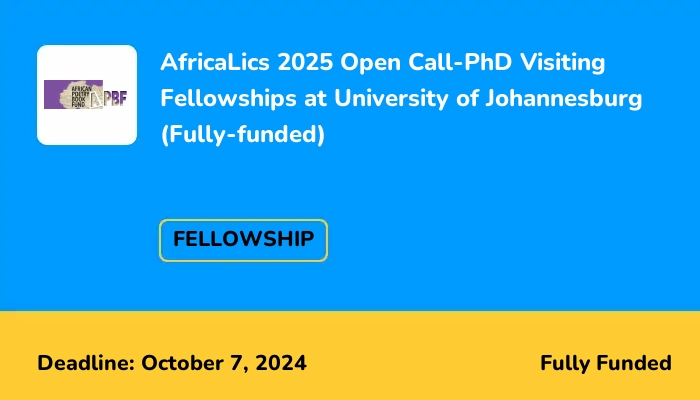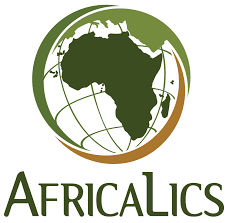 Menu
Menu
Published: 16 Sep 2024 1,060 views

AfricaLics – the African Network for Economics of Learning, Innovation and Competence Building Systems – is inviting suitable PhD student candidates from universities in African countries to apply for participation in the AfricaLics PhD Visiting Fellowship Programme (2025 cohort) focused on Innovation and Development.
Successful candidates will participate in a fellowship programme combining online pre- and post-activities with a study period of 3 months at the University of Johannesburg (UJ) in South Africa. The three-month study visit to UJ is, however, subject to the availability of funding. While the AfricaLics Secretariat and Scientific Board are searching for funds to finance the study visit, successful candidates are also expected to help search for funds to finance their study visit at UJ themselves (see section on funding issues).
Mentoring will be provided by a range of African and international scholars in Innovation and Development studies, who are members of the AfricaLics and Globelics communities. The programme will also receive support from the Trilateral Research Chair in Transformative Innovation, the Fourth Industrial Revolution and Sustainable Development (TRCTI) Please see: https://www.uj.ac.za/faculties/cbe/SARChI-TRCTI).
The 2025 VFP cohort activities will kick off with a range of online activities starting in the first half of February 2025. The study visit at UJ is expected to take place from 1st September to 30th November 2025 and will be followed up by a few additional online activities in December 2025. After engagement in the programme, students are offered the opportunity to continue engaging with the AfricaLics community e.g. through participation in AfricaLics Alumni activities, AfricaLics research conferences, our webinar series and the activities organised by national chapters of AfricaLics e.g. in Nigeria, Ethiopia and Burkina Faso. Through such activities, VFP alumni can continue to support the development of African Innovation and Development studies and benefit from network activities.
Within the AfricaLics community, innovation is broadly defined as spanning from “new to the world inventions” to the diffusion and use of technology new to the user or context in which it is introduced and includes competence building among users of innovation. Technology here can mean both a physical product; a new process e.g. for manufacturing a product and new way of doing or organising things. Innovation and Development Studies research as defined by the AfricaLics network includes the study and management of processes that link technological and social innovation with development. This includes studies and improved understandings of how learning and competence-building systems contribute to development processes. The programme gives priority to students working on topics identified by the AfricaLics network as important to the future of Africa. For more info on the main thematic areas addressed by AfricaLics, please see: https://www.africalics.org/thematic-areas/.
Scholars in the field may have a background in economics and/or other social sciences (e.g. Sociology, Political Science, Science and Technology Policy, Geography, History or Development Studies). Some work within the STEM (science, technology, engineering or mathematics) subjects or even manufacturing. All scholars, regardless of their disciplinary backgrounds look at one or more elements at the intersection between innovation and development. They work within a broad range of areas including energy and sustainable development/transformation, health, gender, agriculture, manufacturing and work organisation, big data and the fourth industrial revolution.
To understand more about the field of innovation and development and see if your work fits within this research area, please look at papers published in relevant journals including (but not only) the following: African Journal of Science, Technology, Innovation and Development; Innovation and Development; Research Policy; Journal of International Development; International Journal of Technology Learning, Innovation and Development; International Journal of Technology Management and Sustainable Development; Journal of Development Economics; Journal of Science and Technology Policy; Journal of Evolutionary Economics and Journal of Technological Forecasting and Social Change (see: https://www.africalics.org/innovation-and-development-studies-resources/).
The aim of the visiting fellowship programme and the scholarships is to help African PhD students working in the field of Innovation and Development to strengthen their academic/research qualifications; improve the quality of their dissertations and prepare for a career in innovation and development either within academia or outside (e.g. in the private sector or in government/policy making).
The visiting fellowship programme does this by increasing the mobility and level of exposure of the PhD students to international knowledge in the field of innovation and development. The programme forms part of the efforts by AfricaLics to contribute to the development of a vibrant research community in Africa in this emerging and highly multidisciplinary field. The Swedish Development Agency, Sida (Stockholm), has provided for the visiting scholarships as part of the project Enhancing research capacity on Innovation and Development in Africa through the African Network on Learning, Innovation and Competence Building Systems (AfricaLics) – Phase II since 2015 and will continue to support the online part of the VFP also in 2025.
The AfricaLics secretariat (hosted by the African Centre for Technology Studies) is responsible for the research capacity-building project. The AfricaLics Scientific Board provides advice on scientific matters and issues of strategic importance. The AfricaLics PhD Visiting Fellowship Programme 2025 is jointly organized by the AfricaLics secretariat and UJ’s DSI-NRF Trilateral Research Chair in Transformative Innovation, 4IR and Sustainable Development (‘UJ-TRCTI’) in South Africa with support from the AfricaLics and Globelics scholars based at other relevant African and international universities active in the field of Innovation and Development. Selection of mentors for the students in the 2025 cohort will be done in a way that ensures the best possible match with the successful PhD visiting fellows.
Activities under the AfricaLics PhD Visiting Programme should form an integrated part of the PhD work plan for each applicant. The plans typically include various elements such as:
The visiting fellows are encouraged to remain engaged with the AfricaLics network after the fellowship period through activities in the AfricaLics alumni network and participation in AfricaLics Conferences and other events.
Activities of the alumni network are advertised here: https://africalics.org/alumni-events/. Current and former participants in the AfricaLics VFP are listed on the AfricaLics website (see: https://africalics.org/vfp/.
AfricaLics is the acronym for the African Network for Economics of Learning, Innovation, and Competence Building Systems. AfricaLics brings together scholars, researchers and policy analysts who study development, innovation, learning and competence building in an African context. Africalics was founded during an Innovation and development workshop that took place in March 2012 in Dar es Salaam, Tanzania. The workshop was co-organized by the Globelics Secretariat and the Science, Technology and Innovation Policy Research organization (STIPRO), a Tanzanian independent think tank. The format... continue reading

| Application Deadline | 07 Oct 2024 |
| Country to study | South Africa |
| School to study | University of Johannesburg |
| Type | Fellowship |
| Course to study | View courses |
| Sponsor | AfricaLics |
| Gender | Men and Women |
Successful PhD candidates are responsible for ensuring that their passport is valid for the time they will be staying in Johannesburg in South Africa and for dealing with any issues related to the legality of their stay in South Africa (letters of invitation will be forwarded). Details of how to apply for your visit visa in South Africa will be sent to successful candidates in due time.
If funding for the study visit to UJ is secured either by an individual participant in the 2025 VFP cohort or by the AfricaLics secretariat/network as part of collective fundraising efforts, the AfricaLics secretariat and staff at UJ will help organise accommodation for students during the study visit in Johannesburg. The accommodation will be near the business school campus of the University of Johannesburg where the students will have their working space.
The scholarship option is open to PhD students from countries in Africa classified by the OECD/DAC as low and lower-middle-income countries whose studies – irrespective of sectoral discipline – focus on the relationship between innovation and economic, social or environmentally sustainable development. Female PhD students are particularly encouraged to apply as AfricaLics endeavours to contribute to increasing the currently low number of female scholars in Innovation and Development research studies in Africa. Likewise, PhD students from low-income countries are particularly encouraged to apply as AfricaLics endeavours to strengthen research capacity in Innovation and Development in low-income countries in Africa.
Applicants must be enrolled as PhD students in a relevant programme at an African university and must have completed their first year of PhD studies by December 2024. A maximum of six visiting scholarships will be available in 2025, but the final number of accepted visiting fellows will depend on the in-depth assessment of applications and funding availability. The visiting scholarship is complementary to the studies of the PhD students at their home universities and applicants must already have secured basic funding for their PhD studies from other sources (e.g. African governments, other organisations, self-financing). In addition, students interested in the programme must commit to help fund-raising for the physical study visit to UJ e.g. through applications to their home university or to organisations such as Codesria, AERC, KIC NRF SA or WARA (see https://www.westafricanresearchassociation.org/fellowships/warc-travel-grant/), etc.
Applicants for the AfricaLics PhD visiting fellowship programme should:
The following documents must be submitted with the brief application:
You are NOT expected to submit a copy of your passport when applying for the PhD visiting fellowship programme. If you are offered the scholarship and the study stay at UJ materialises, you will be asked to handle any visa issues that may be relevant yourself with support from the AfricaLics Secretariat and UJ. Collection of personal data will be kept at a minimum and information will be stored safely and will not be used for any other purposes.
Applications with all relevant attachments should be forwarded to [email protected] by 23.00hrs East Africa time on 7th October 2024.
Applications not fulfilling the requirements above will not be considered, so please forward any questions you may have to [email protected] and you will be assisted.
Successful candidates will be notified by mid-December 2024 or early January 2025, following which they will be required to sign a study agreement form and – later in the process – deal with any issues related to visa issues for the study visit to South Africa. The final notification date will be communicated once the review process has commenced.
For more details visit: AfricaLics website.